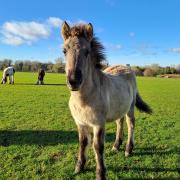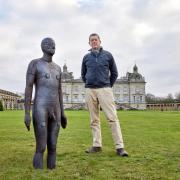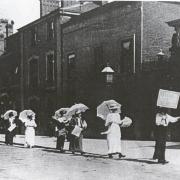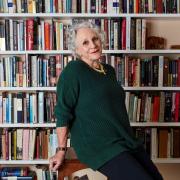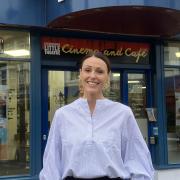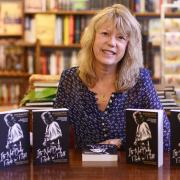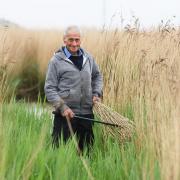He’s been scrambled out of Pakistan, was a diplomat in Yugoslavia as the country fell apart, negotiated nuclear deals with Russia and even his name has a fascinating back-story

Lorne Green's first job was in his family's grocery shop. There were no staff, just his mum and dad and sister and him to run the shop seven days a week from morning to midnight. Lorne would gaze at the magazines full of photographs of exotic places and dream of taking one of the trains which ran past his home in a small Canadian town to see the world.
Now 73, Lorne, Police and Crime Commissioner for Norfolk, can look back on a diplomatic career that has taken him around the globe.
It was in the family shop that he got talking to a customer who turned out to be a Canadian MP. Later he got him his first taste of political life, as a student guide 1,000 miles away in Canada's parliament. Two politics degrees, and two attempts at the foreign service exams later, at just 22, Lorne landed a job at the United Nations in New York.

"Canada's policy was never to leave its seat unoccupied, so sometimes the most junior person, which was me, would be sat there," he said. It was an ideal grounding for his next job, in Pakistan. During fighting with India the danger was so great that the embassy was evacuated to Tehran. Newly married, and with just a 15lbs baggage allowance, Lorne smuggled an entire 12-place cutlery set wedding gift in his coat pockets - in the days before x-ray checks for flights "I was bent double with the weight," he said. Arriving in the heat of Tehran he took off the coat - and left it on the bus, never to be seen again. When they eventually returned to Islamabad everything in their home was untouched.
As hippies streamed from the west towards India, Lorne's work sometimes involved travelling through the Khyber Pass into Afghanistan, where peace and love came with an undercurrent of drugs and death.
In Belgrade, in the former Yugoslavia, Lorne lived next door to the tomb of the recently deceased Tito. "Coach-loads of visitors would turn up to mourn the founder of the country and it was customary for every person to bring 40 roses," he said.

As the situation darkened and diplomacy failed to prevent war, western countries withdrew their staff. "I was running the embassy when we brought in 2,500 Canadian peace-keepers. By the time I left, in 1992, the country had fallen apart," he said.
Lorne and his wife, Valerie, celebrate their 50th wedding anniversary in September. They met on a bus in Canada. "I'd been waving my fiancée goodbye when I first saw her!" he admitted. And it is Valerie who brought him to Norfolk. Her family have run Diglea Caravan Park in Snettisham for decades. Lorne and Valerie married in Snettisham church and settled in west Norfolk, between postings around the world - including Albania, Bulgaria (when there was a coup while Lorne was based in Sofia) the Netherlands and London.
Back in Snettisham, Lorne and Valerie bought The Old Bank bistro and ran it as a café. When a son was born they celebrated by installing floodlights for the village church - and funding them for 21 years.
They now have three children, six grandchildren and, always, a dog. Their roots here are deep, but there is tragedy not far back in Lorne's family tree. He was named after Canadian actor Lorne Greene, but his own Green name was adopted from his father's foster family. Abie Green was born Abraham Sulivniuk, to a Polish Jewish family, in a village which is now Ukrainian. He was orphaned as a young child and he and his siblings were separated. The three youngest, including Abie, qualified for a Canadian charitable scheme but were split between three families. A sister eventually made it to Israel, but the two older children, who had begged to be allowed to travel to Canada with their brothers, did not survive the Holocaust.
Lorne began his career with the United Nations, established to prevent future wars. Later he worked for Nato's nuclear planning group, helping negotiate a treaty to reduce the number of nuclear weapons in the world. He became director of nuclear and arms control policy in the Canadian defence ministry and then helped launch an organisation focused on moving nuclear material safely.
Four years ago Lorne was trying, and failing at, retirement when he was asked to stand as the Conservative candidate for the county's police and crime commissioner role. He is now in overall charge of police resources and budgeting in Norfolk, charged with ensuring the police are effective, efficient and accountable. But, a family man at heart, he has been most moved by meeting people who have suffered from domestic abuse. He has also championed a scheme to give Norwich prisoners the chance to help care for dogs which need rehoming.
Lorne does not plan to stand for re-election next year, but will not be re-retiring either.
Opening another restaurant appeals, or perhaps academia, studying policing and crime. Twenty five years ago he wrote two biographies of Scottish-Canadian engineer and inventor Sanford Fleming. "He was a kind of 19th century Leonardo da Vinci," said Lorne, who has also written a book about his native Canada, the cover an image of a lake high in the majestic Rockies. However, ask what his favourite view in the world and there is no hesitation - it has to be looking out across the Wash from Ken Hill, Snettisham.




